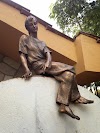The other night I dreamt the elections were over. How surprised, and delighted, I was.
Contrary to expectations, millions of people actually voted. Droves of disaffected South Africans turned out not to spoil their ballots, but to actually vote. Sick of corruption and empty promises, many unmoved by empty threats of losing their social grant, they voted strategically: the opposition on Left and Right gained ground. The result: a hung parliament requiring a coalition government. And as with the national, so it was at provincial level.
It was a dream of course, I mused over my morning coffee. But there was something in it that needed further reflection.
The Catholic principle of the Common Good demands, among other things, participation, cooperation and compromise. Participation goes beyond the regular ritual of voting, and entails ongoing engagement with political issues, not simply by professional politicians but by everyone. It is closely linked to Subsidiarity, the notion that power should be devolved to local and regional levels wherever possible. Different perspectives on problems need to be heard and taken into any policy.
Such an approach demands cooperation and a willingness to compromise. A hard-headed ideological standpoint does not help. We already see aspects of this in Parliamentary and other legislature committees where policy is debated openly across party lines. As a result compromises are already reached. Where this falls down, however, is in a situation of a one party dominant democracy like ours – the weight of numbers, and at times open political antagonism, renders genuine cooperation and compromise difficult.
In a coalition government, participation, cooperation and compromise are essential.
But, as I said, this was just a dream.
Behind my dream however, I suspect, was a desire, even a series of desires. It can be summed up as the desire for a really working, as opposed to merely functional, democracy. A merely functional democracy occurs when people go through all the electoral and legislative rituals but without people really having power. Political elites (who, when you analyse them, often sound all too similar) hold power and decide everything, condescending to let the masses vote for them. The result is popular resignation, even despair – sometimes punctuated by outbursts of often violent protest.
Without being accountable the elites carve up society for their own benefit. Patronage, as opposed to state terror (of which we were all too familiar in South Africa), is the way society is governed: Keep them poor, keep them uneducated, and keep them dependent.
Sounds familiar?
A Catholic understanding of democracy stresses participation. Participatory democracy (which so many great South Africans have embraced) means that all adult citizens have a right and duty to engage as fully as possible in public life. Democracy begins with voting – which is why we must vote – but that is just the start. Our elected representatives are accountable to us, and we must call them to account.
Maybe, at bottom, that’s what my dream was about: calling our representatives to account. That’s what every election is about. That’s what this election is about.
Whether you share the content of my dream or not, get out there on May 7th and vote.




